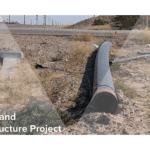
Environmental survey services play a crucial role in identifying and assessing potential environmental risks and impacts. In Texas, where the richness of natural resources intertwines with rapid urbanization, the need for comprehensive environmental surveys is paramount. This article aims to shed light on the importance of environmental surveys, the various types of services available, the process involved in conducting surveys, regulatory compliance requirements, and crucial factors to consider when choosing a survey service in Texas.
Understanding the Importance of Environmental Surveys
Environmental surveys serve as a foundation for informed decision-making in various sectors. In the realm of urban planning, these surveys provide invaluable insights into understanding the present environmental landscape and identifying areas of concern that require special attention.
Moreover, environmental surveys play a crucial role in guiding policymakers, developers, and conservationists towards sustainable practices and responsible decision-making. By delving deep into the intricate web of ecosystems and natural resources, these surveys offer a comprehensive view of the environmental factors at play, highlighting the interconnectedness of human activities and the environment.
The Role of Environmental Surveys in Urban Planning
Urban planning involves the careful coordination of land use, infrastructure development, and environmental sustainability. Environmental surveys serve as a tool to assess the impact of urbanization on natural resources, fauna, flora, and ecological systems. By identifying potential risks and impacts, urban planners can make informed decisions to mitigate adverse effects and strike a balance between development and environmental conservation.
Furthermore, environmental surveys aid in fostering community engagement and raising awareness about the importance of preserving green spaces, reducing pollution, and promoting sustainable practices within urban areas. Through public participation and stakeholder involvement, urban planning initiatives can be enriched with diverse perspectives and innovative solutions for creating healthier and more resilient cities.
Environmental Surveys and Natural Resource Management
Natural resource management is crucial for maintaining ecological balance and sustaining biodiversity. Environmental surveys aid in assessing the health of land, water bodies, and air quality, providing necessary data to implement effective conservation measures. By conducting surveys, professionals can identify areas that require habitat restoration or conservation efforts, ensuring the sustainable use of natural resources in Texas.
Moreover, the data collected from environmental surveys serves as a valuable resource for policymakers and researchers in developing strategies for land use planning, wildlife conservation, and climate change adaptation. By leveraging scientific findings and empirical evidence, decision-makers can steer towards a more sustainable path that safeguards the environment for future generations and promotes harmonious coexistence between nature and human development.
Types of Environmental Survey Services
Environmental survey services encompass various specialized assessments that cater to different facets of environmental analysis. These surveys aid in understanding the quality and condition of specific environmental components. Some common types of environmental survey services in Texas include:
Land and Soil Surveys
Land and soil surveys evaluate the physical, chemical, and biological properties of the land. These surveys assess soil quality, contamination levels, and suitability for specific land uses. By understanding the properties of the soil, landowners and developers can make informed decisions regarding land use planning and management, minimizing the potential risks.
Water Quality Assessments
Water quality assessments analyze the composition and state of water bodies, including rivers, lakes, and groundwater. These assessments help identify pollution sources, evaluate water quality parameters, and assess the health of aquatic ecosystems. By monitoring and managing water quality, stakeholders can ensure the availability of clean and safe water while preserving the integrity of ecosystems that depend on it.
Air Quality Surveys
Air quality surveys assess the presence and level of pollutants in the air, determining potential health risks and environmental impacts. These surveys play a vital role in identifying areas with poor air quality, such as those affected by industrial emissions or vehicular pollution. By understanding the sources of pollution and their impacts, policymakers can implement strategies to improve air quality, creating healthier environments for residents.
The Process of Conducting an Environmental Survey
The process of conducting an environmental survey involves several stages that ensure a comprehensive understanding of the environmental landscape. These stages include:
Initial Site Assessment
The initial site assessment involves a preliminary evaluation of the site’s environmental characteristics and potential risks. This stage includes desk research, site visits, and data collection to identify potential environmental concerns that require further investigation.
Detailed Site Investigation
The detailed site investigation involves in-depth fieldwork and monitoring to assess the environmental conditions and identify any contamination or ecological risks. This stage may include soil sampling, water sampling, air quality monitoring, and ecological surveys to gather accurate data for analysis and risk assessment.
Risk Assessment and Management
After gathering the necessary data, a thorough risk assessment is conducted to evaluate the potential impact on human health and the environment. Based on the results, risk management strategies are developed, including remediation plans, risk mitigation measures, and monitoring protocols to address and manage any identified risks.
Regulatory Compliance in Environmental Surveys
Environmental surveys are subject to various regulations at both federal and state levels. Compliance with these regulations ensures that surveys are conducted according to standardized protocols and guidelines. In Texas, environmental survey services must adhere to:
Federal Environmental Regulations
Federal regulations, such as the National Environmental Policy Act (NEPA) and the Clean Water Act, establish guidelines for environmental surveys and assessments. These regulations set the framework for understanding potential impacts and implementing mitigation measures to protect natural resources and ecosystems.
State-Specific Regulations in Texas
Additionally, Texas has its own specific environmental regulations, such as the Texas Commission on Environmental Quality (TCEQ) guidelines. These regulations outline the requirements for conducting environmental surveys and the necessary permits or licenses for specific activities. Compliance with state regulations ensures that surveys are conducted in alignment with Texas’ environmental priorities.
Choosing the Right Environmental Survey Service
When selecting an environmental survey service, it is essential to consider several factors to ensure the credibility and effectiveness of the survey. These factors include:
Factors to Consider When Selecting a Service
- Experience and Expertise: Look for a service provider with extensive experience and expertise in the specific type of survey required. Experienced surveyors are more likely to accurately assess potential risks and formulate effective mitigation strategies.
- Accreditations and Certifications: Verify that the survey service holds the necessary accreditations and certifications. These credentials ensure that the service provider adheres to industry standards and follows established best practices.
- Technological Capabilities: Assess the technology and tools employed by the survey service. Advanced technology can enhance the accuracy and efficiency of surveys, providing more reliable and comprehensive data.
- Reputation and References: Seek feedback from previous clients and evaluate the service provider’s reputation. Positive references and a solid track record are indicators of a reliable and trustworthy survey service.
The Importance of Certified and Experienced Surveyors
Certified and experienced surveyors play a crucial role in conducting accurate and reliable environmental surveys. Their expertise in data collection, analysis, and risk assessment ensures that surveys provide a comprehensive understanding of environmental conditions. By choosing a survey service with certified and experienced surveyors, clients can have confidence in the survey results and the subsequent decision-making processes.
In conclusion, environmental survey services in Texas serve as a crucial tool in understanding and managing the natural environment. These services aid in urban planning, natural resource management, and regulatory compliance. By selecting the right survey service, stakeholders can ensure the accuracy and reliability of survey data, fostering sustainable development and the preservation of Texas’ diverse environmental landscape.
As you consider the critical role of environmental survey services in Texas for your urban planning, natural resource management, or regulatory compliance needs, partnering with a trusted expert is key to ensuring success. ESE Partners, with our extensive experience and presence across major Texas markets, stands ready to guide you through the complexities of environmental challenges. Whether you require assistance with water compliance, due diligence, or any other environmental service, our team of dedicated professionals is equipped to deliver honest, quality-driven results. Don’t let changes in regulatory processes slow you down. Request A Proposal today and let ESE Partners help you responsibly move your business forward through innovative environmental problem solving.








